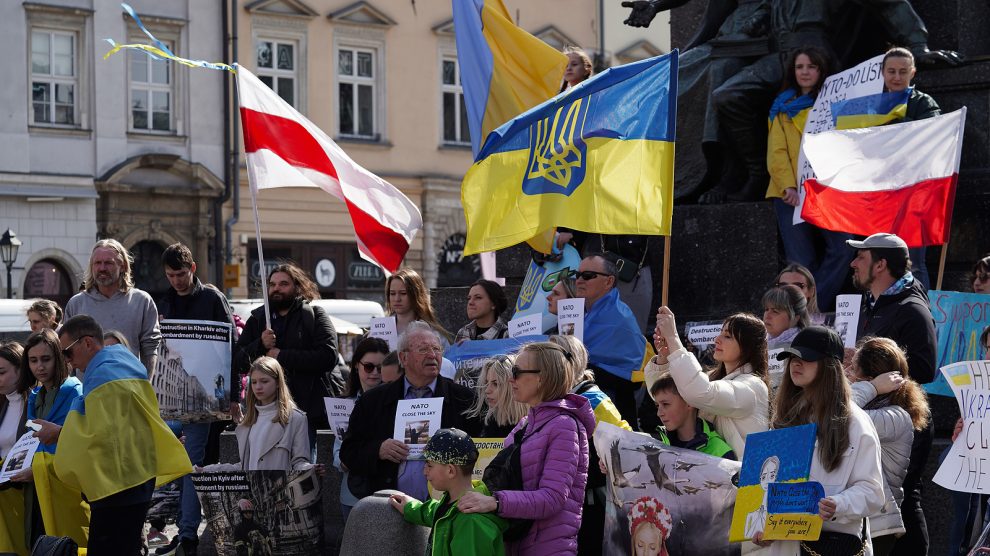Russia’s disinformation campaign wants to convince Ukrainians that Poland is preparing to annex its western territories. It’s nonsense, but dangerous, and has implications for NATO.
Russian propaganda attaches great importance to promoting anti-Polish lies. Among the most frequent of these lies are allegations that Poland wants to attack Ukraine and annex its western territories. This nonsense, that may only amuse some people, is in fact a part of a serious and dangerous disinformation operation targeted at Poland, which also has implications for the whole of NATO.
- Where are the Russian protests against the invasion of Ukraine?
- Explainer: No, Ukraine’s president hasn’t banned the Orthodox Church
- Freedom on Fire: A humanising chronicle of Ukraine’s struggle
Russian propaganda falsely claims that Poland is preparing to annex western territories of Ukraine, while all the effort put in helping Ukrainians is a cynical game related to the plan of attack.
There are allegations that the Polish government wants the historical Republic of Poland reborn, or that it proceeds with preparations for annexation referenda. Some propagandists are accusing Poland of planning to seize the whole Ukrainian state or to partition it – together with Romania and Hungary.
The objective of such lies is clear – it is about provoking chaos, destabilising the international situation, antagonising Poles and Ukrainians and undermining Poland’s position in the international arena.
The fact that the most prominent Russian politicians, including even Vladimir Putin, refer to alleged Polish “territorial ambitions” and plans to “partition Ukraine” prove the significance of this narrative for Russian propaganda.
In one of his latest addresses, Putin repeated lies that “Polish nationalists” sought to regain territories of western Ukraine that were “historical to Poland”, highlighting that “there were no doubts” such plans existed.
Putin was even suggesting that it was Poland that posed the biggest threat to Ukraine, while Russia was a guarantor of security.
The same propaganda theses – not for the first time – were spread by the Head of the Foreign Intelligence Service of the Russian Federation Sergey Naryshkin. According to Naryshkin, Poland is now intensifying its actions aimed at seizing the Lviv, Ivano-Frankivsk and Ternopil oblasts, which is supposed to result from Poland’s claims for appropriate “compensation” for aid delivered to Ukraine.
In order to strengthen this anti-Polish narrative, Russian propaganda uses information sabotage aimed at confirming Polish plans for the annexation of Ukraine.
To this end, false evidence and documents are fabricated that are then disseminated in the regime’s media outlets and on social media platforms – as proof supporting the Kremlin’s narrative about a future attack against Ukraine.
False narratives
In April, Russian propaganda channels released a fake order from the Head of the General Staff of the Polish Army indicating alleged preparations of Polish units to take control over strategic targets in the Lviv and Volyn oblasts – a deliberate disinformation operation to confirm the false claims.
The same objective was behind the propagation of fabricated Polish documents – fake voting ballots of the Polish National Electoral Commission – that were supposed to be prepared for a referendum on Ukraine’s accession to Poland. There was also a fake document purported to be from the Polish Embassy in Kyiv concerning alleged questionnaires about “a Polish protectorate” in Ukraine. Such examples may be multiplied.
This anti-Polish message, repeatedly incited since the beginning of the Russian aggression, is directed both to the audience in Ukraine and for internal purposes in Russia.
Firstly, narratives about forthcoming annexation are meant to antagonise the Polish and Ukrainian nations, undermine trust towards Poles, revive historical resentment and, in consequence, to destabilise Polish-Ukrainian relations.
The objective of this message is also to weaken Poland’s position among western partners. Russia is determined to portray our country as a warmonger, with whom it is difficult to stand arm in arm.
For Russians, these themes are supposed to reenforce the view that Poles are eternal enemies and to amplify the feeling that Russia is becoming a besieged fortress, threatened from all sides. The analysis of narratives and actions of the Russian propaganda indicate that substantial efforts are engaged in promoting false claims about Polish plans to attack Ukraine – as well as in other narratives targeted at Poland.

Orders ‘from the top’
It seems that the authors of these propaganda campaigns, carrying out their line actions, received guidelines “from the top” ordering them to fabricate materials against Poland. The scale of fake documents related to the attack and annexation of Ukraine suggests that Poland is becoming more and more significant as a target of aggressive Russian operations.
These actions are designed to have short term effects – antagonise Poland and Ukraine, provoke chaos and confusion, as well as to have long term effects – weaken Poland’s security and isolate Poland in the international arena through systemic lies and falsehoods.
These are strategic objectives for Russia which wishes to weaken NATO’s eastern flank with its propaganda operations, political steps and pressure.
Although we are analysing information actions, the stakes – as we can see – are high. The Russian anti-Polish operation poses a threat of a strategic nature. And not only to my own country.
Unlike many news and information platforms, Emerging Europe is free to read, and always will be. There is no paywall here. We are independent, not affiliated with nor representing any political party or business organisation. We want the very best for emerging Europe, nothing more, nothing less. Your support will help us continue to spread the word about this amazing region.
You can contribute here. Thank you.


